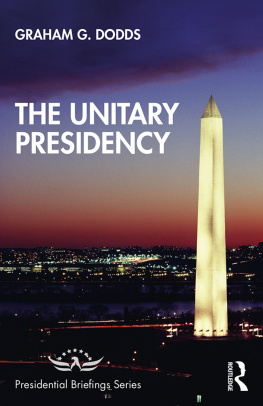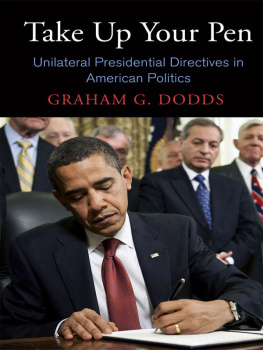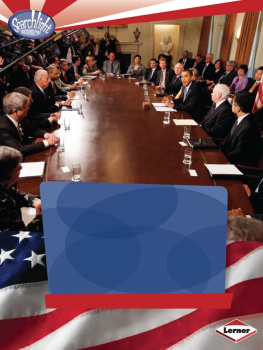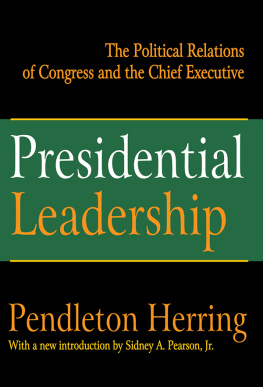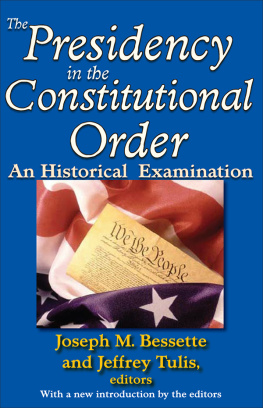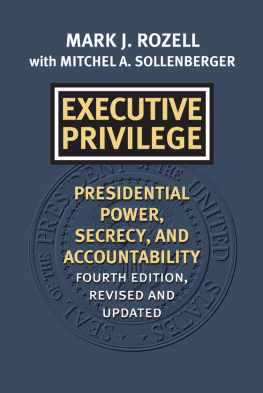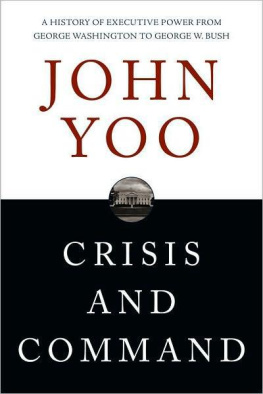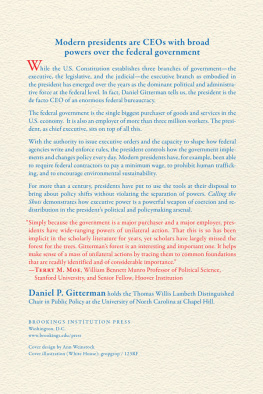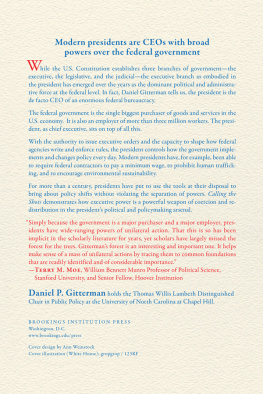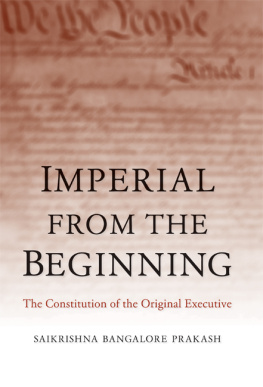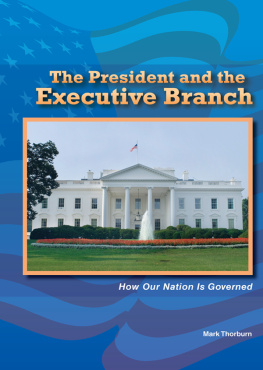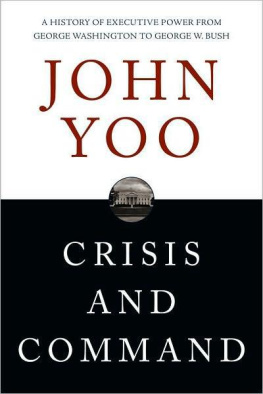Dodds provides an essential discussion for understanding todays battles and tomorrows headlines over the scope of presidential power, concisely mapping the contours of unitary executive theory and practice across American history. The unitary executive is neither a fiction nor a fact, he argues, but a political instrument. Enforcing the Constitutions constraints on unilateralism will thus come not from toying with textual definitions but from political will.
Andrew Rudalevige, Bowdoin College, USA
Dodds book represents the best comprehensive study to date on the unitary executive theory in American politics. This work is not only relevant for scholars seeking to understand the exercise of presidential power during the recent George W. Bush, Barack Obama, and Donald Trump administrations, but it assesses the unitary executive in relation to the evolving American presidency since George Washington. More importantly, it helps to clear the muddy waters in presidential research by demonstrating how the theory of the unitary executive is distinct from scholarly notions of the administrative and unilateral presidencies.
Adam L. Warber, Clemson University, USA
What a very fine book this is! To come to grips with the unitary presidency is no easy task. Professor Dodds marshals historic examples, weighs normative claims, and evaluates empirical evidence in his treatment of this important topic. He skillfully demonstrates that supporters as well as opponents of the unitary presidency have reason to be simultaneously cheered and unsettled. I would use this text in an upper-level undergraduate political science course, but Professor Dodds cogent writing makes this text accessible to an even broader audience.
Barry L. Tadlock, Ohio University, USA
THE UNITARY PRESIDENCY
The theory of the unitary executive is one of the most controversial and significant constitutional doctrines of the past several decades. It holds that the U.S. president alone embodies all executive power and therefore has unlimited ability to direct the many people and institutions within the federal governments vast executive branch. It thus justifies the presidents prerogative to organize the executive branch and to direct its activities, to tell executive personnel what to do and to fire them if desired, to control the flow of information, and to issue signing statements that make judgments about constitutionality and determine the extent to which laws will be implemented. In some versions, it also endorses implied or inherent powers and permits the president to completely control foreign policy and military action.
Proponents say this conception of the presidential office is faithful to the Constitution, facilitates the sort of energetic executive that Alexander Hamilton argued for, and enhances administrative efficacy and political accountability for governance. Critics say this arrangement is constitutionally inaccurate, is belied by historical practice and legal precedents, and is dangerously close to the monarchical power that provoked the American Revolution and can be especially threatening in the era of Donald Trump.
This book examines how controversies about unitary executive power have played out from the founding era to the present day with a focus on recent presidents, it explores arguments both for and against the unitary executive theory, and it looks ahead to future implications for American politics.
Graham G. Dodds is an Associate Professor of Political Science at Concordia University in Montreal. He has also taught at the University of Pennsylvania and in France and has worked at the Brookings Institution and for a Member of Congress. He is the author of the book Take Up Your Pen: Unilateral Presidential Directives in American Politics and is frequently interviewed by journalists about U.S. politics.
Presidential Briefings
Series Editor: Robert J. Spitzer, State University of New York College at Cortland
The Presidential Briefings series provides concise and readable introductions to topics of concern to those who have been and will be President of the United States. For students of the presidency, these books provide a highly practical and accessible overview of an important subject related to the presidency. By approaching their subjects from the vantage point of what a president most needs to know, and what the citizenry most need to know about the presidency, these books are authoritative and significant works.
Robert J. Spitzer is a Distinguished Service Professor and Chair of the Political Science Department at the State University of New York College at Cortland, as well as a Visiting Professor at Cornell University. He led the Presidents and Executive Politics organization (formerly the Presidency Research Group) of the American Political Science Association from 20012003, and is a regular contributor to various media outlets.
Presidential Leadership in an Age of Change
Michael A. Genovese
Political Rhetoric
Mary E. Stuckey
Making Foreign Policy Decisions
Christopher J. Fettweis
For more information about this series, please visit http://www.routledge.com/Presidential-Briefings-Series/book-series/PBSTRANS
First published 2020
by Routledge
52 Vanderbilt Avenue, New York, NY 10017
and by Routledge
2 Park Square, Milton Park, Abingdon, Oxon, OX14 4RN
Routledge is an imprint of the Taylor & Francis Group, an informa business
2020 Taylor & Francis
The right of Graham G. Dodds to be identified as author of this work has been asserted by him in accordance with sections 77 and 78 of the Copyright, Designs and Patents Act 1988.
All rights reserved. No part of this book may be reprinted or reproduced or utilised in any form or by any electronic, mechanical, or other means, now known or hereafter invented, including photocopying and recording, or in any information storage or retrieval system, without permission in writing from the publishers.
Trademark notice: Product or corporate names may be trademarks or registered trademarks, and are used only for identification and explanation without intent to infringe.
Library of Congress Cataloging-in-Publication Data
A catalog record for this title has been requested
ISBN: 978-1-138-48417-7 (hbk)
ISBN: 978-1-138-48418-4 (pbk)
ISBN: 978-1-351-05278-8 (ebk)
Typeset in Bembo
by codeMantra
For Amy
Contents
What is the unitary executive theory, its origins, basis, and supposed benefits?
Episodes concerning what would later be called the unitary executive, from George Washington through the 1970s
Ronald Reagan and the birth of the explicit doctrine of the unitary executive, as well as how George H.W. Bush and Bill Clinton utilized it
George W. Bushs vigorously unitary presidency, as well as how it evolved under Barack Obama and Donald Trump
Is the unitary executive theory faithful to the intentions of the founders and the constitutional text; is it good for effective administration and political accountability?
Does the unitary executive theory accurately describe what actually happens in the executive branch, or is practice more complicated than the principle?
Ultimately, the ability of presidents to utilize the unitary executive theory is determined politically.

